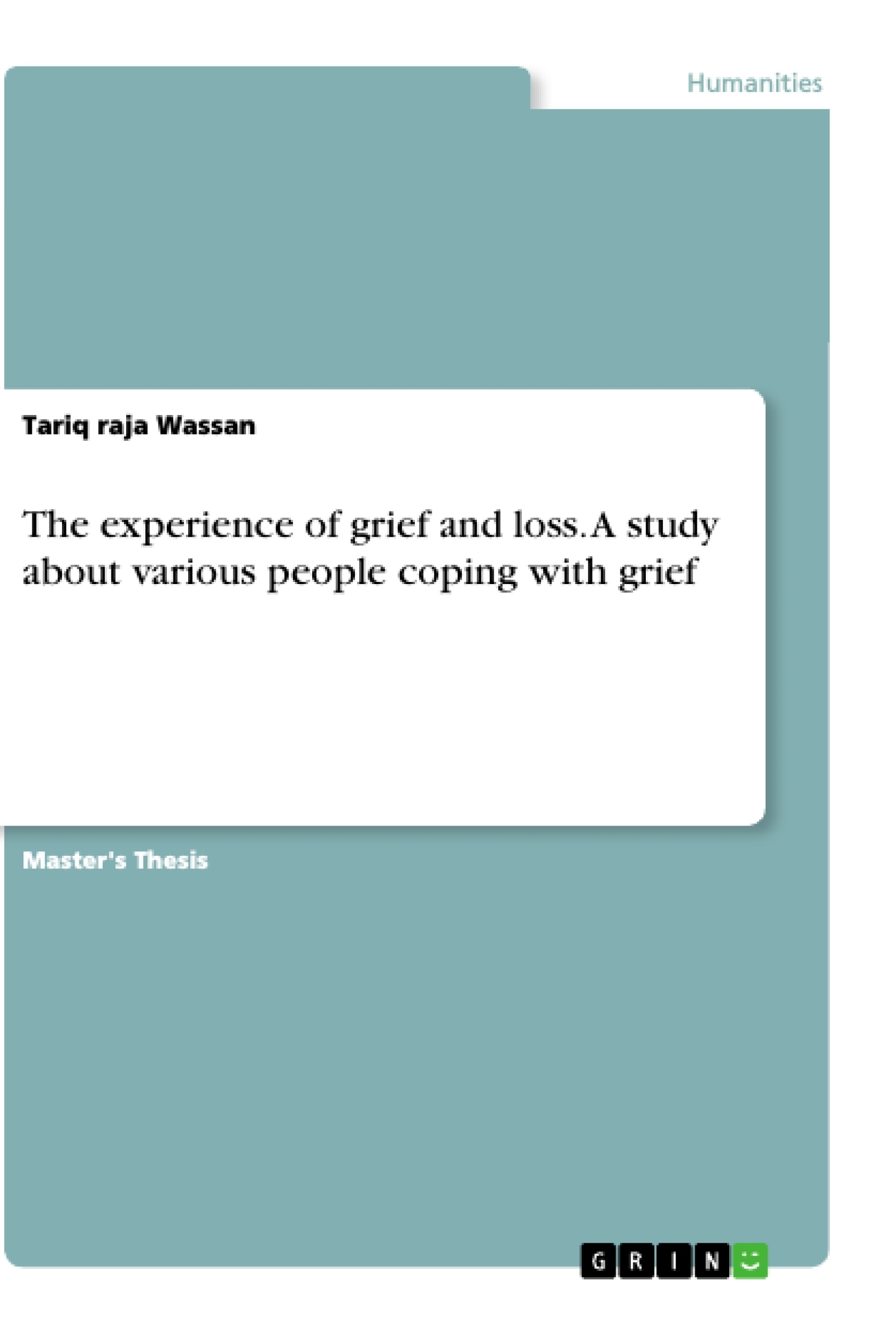This study qualitatively explores the experiences of nine people regarding their grief and loss. Four women, four men and a guest were interviewed using a set of open-ended questions. All the participants were interviewed once in a semi-structured, face to face format and were asked about their experiences of grief and loss. A thematic analysis revealed key areas that included emotional reactions, spirituality, moving forward and memories of past losses/remembering. Moreover, it includes sub themes such as controlling feelings, hopelessness, healing and harm. These findings have the strength to add great depth to our understanding of the complexities associated with grief and loss. Death has been a epicentre concern of human, but in a society where death is being denied, its place is ambiguous. So, death is final and irreversible. Loss from death is fixed and permanent and for bereaved, complete grief recovery from the loss may not occur. Thus, it is pertinent for counsellors to understand the experiences of bereaved individuals in order to bolster them in accepting the reality of death, hinder lasting distress and agony, and find resources to continue their lives. In the contemporary era, counsellors are exposed to loss and grief experiences in their personal lives and in their professional work. According to Neimeyer (2004), every change in life involves loss and all losses require change. The emotional reaction of loss is grief. Muller and Thompson (2003) described the death of loved ones as the most penetrating loss individuals can experience and the most frequent and changing issue counsellors face with their clients. Loss and grief are common themes and sources of presenting problems in counselling sessions.
Inhaltsverzeichnis (Table of Contents)
- Chapter 1: Introduction
- Chapter 2: Literature Review
- Introduction
- Persistent Grief in Youth
- Gender
- Peer Support
- Understanding Cultural Issues in Death
- The Reason of Death Due to Suicide or Natural Phenomenon
- The Difference in the Grieving Process from one Individual to Another
- Hypothesis/General Question of Interest
- Chapter 3: Methods
- Chapter 4: Results
- Theme 1: Emotional Reactions
- Theme 2: Spirituality
- Theme 3: Moving Forward
- Theme 4: Memories of past losses/remembering
- Chapter 5: Discussion
Zielsetzung und Themenschwerpunkte (Objectives and Key Themes)
This thesis aims to provide a qualitative exploration of the experiences of individuals regarding their grief and loss. The study analyzes the emotional reactions, spiritual perspectives, coping mechanisms, and memories associated with grief. It seeks to understand how these experiences vary among individuals and contribute to a deeper comprehension of the complexities surrounding grief and loss.
- Emotional Reactions to Grief and Loss
- The Role of Spirituality in Grieving
- Coping Mechanisms and Moving Forward
- Memories of Past Losses and Remembering
- Variations in Grieving Processes and Experiences
Zusammenfassung der Kapitel (Chapter Summaries)
Chapter 1: Introduction provides a context for the study by exploring the significance of understanding grief and loss, highlighting the challenges associated with death and the need for support in navigating grief.
Chapter 2: Literature Review delves into existing research on grief and loss, examining the impact of persistent grief in youth, the influence of gender, and the importance of peer support. It explores cultural considerations in death, the differences in grieving processes based on the cause of death, and the individual variations in grieving.
Schlüsselwörter (Keywords)
Grief, loss, emotional reactions, spirituality, moving forward, memories, coping mechanisms, qualitative research, thematic analysis, individual experiences, death, bereavement, counselling, cultural context, persistent grief, youth, gender, peer support.
Frequently Asked Questions
What is the main objective of this study on grief and loss?
The study aims to qualitatively explore the experiences of individuals regarding grief and loss, focusing on emotional reactions, spirituality, and coping mechanisms.
What methodology was used in this research?
The researcher conducted semi-structured, face-to-face interviews with nine participants (four women, four men, and one guest) and used thematic analysis to identify key findings.
What are the key themes identified in the results?
The analysis revealed four major themes: emotional reactions, spirituality, moving forward, and memories of past losses or remembering.
How does gender influence the grieving process according to the literature review?
The literature review explores how gender can impact the experience and expression of grief, alongside other factors like peer support and cultural context.
Why is this research significant for professional counselors?
It helps counselors understand the complexities of bereavement, enabling them to better support clients in accepting death and finding resources to continue their lives.
Does the study address the cause of death?
Yes, the study examines differences in the grieving process based on whether the death was due to suicide or natural phenomena.
- Arbeit zitieren
- Tariq raja Wassan (Autor:in), 2020, The experience of grief and loss. A study about various people coping with grief, München, GRIN Verlag, https://www.grin.com/document/941100



